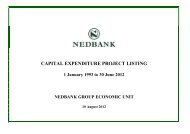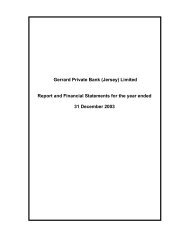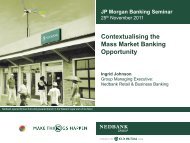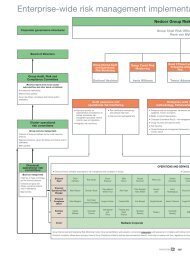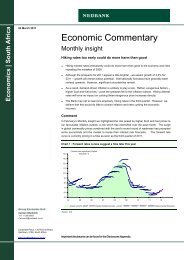NEDBANK CAPITAl - Nedbank Group Limited
NEDBANK CAPITAl - Nedbank Group Limited
NEDBANK CAPITAl - Nedbank Group Limited
- No tags were found...
Create successful ePaper yourself
Turn your PDF publications into a flip-book with our unique Google optimized e-Paper software.
OVERVIEW• Addressing systemic risk and banks’ interconnectedness.More specific proposals are expected to be developed in the firsthalf of 2010.The Basel Committee is mindful of the need to introduce thesemeasures in a manner that raises the resilience of the globalbanking sector over the longer term, while avoiding negativeeffects on bank lending activity that could impair the economicrecovery. To this end the committee is initiating a comprehensiveimpact assessment of the capital and liquidity standard proposalsand has highlighted that ‘decisions on the final proposals andtheir calibration will be made only after a thorough analysisof the impact assessment and the comments received onthe consultative documents. The committee will ensure thatimplementation of the new standards is consistent with financialmarket stability and sustainable economic growth’.The key timelines are as follows:• Consultation period for the December 2009 proposals until16 April 2010.• Undertaking of a comprehensive impact assessment during thefirst half of 2010.• Development of a fully calibrated set of standards by end 2010.• Targeted implementation by end 2012 (including phase-inmeasures and grandfathering arrangements beyond 2012).The complexity of the Basel Committee’s proposals, the risks ofunintended consequences and the interaction between theseand other developments place a strong burden on the bankingindustry to assess the impacts carefully and ensure that the rightbalance is achieved between risk management and economicwellbeing.In conclusion, most of these new developments are still atthe proposal stage and changes are expected following thequantitative impact study, calibrations and consultative process.The exact impact remains uncertain, however, and the issue is not‘if’, but ‘how much?’.Impact of the international regulatory developmentson <strong>Nedbank</strong> <strong>Group</strong><strong>Nedbank</strong> <strong>Group</strong> is supportive of the recent internationalregulatory developments. While some details and clarity are stillsought and refinement needed before they are finalised, theprinciples behind most of the proposals are appropriate, prudentand necessary.The proposed changes will have an impact on the SA bankingindustry, although this will only come into effect after a minimumof three years following finalisation by the Basel Committee,as discussed above, and after the SA Reserve Bank (SARB) hasdetermined exactly what will be adopted and/or modified asappropriate for the SA banking industry.At this early stage <strong>Nedbank</strong> <strong>Group</strong>’s expectation is thatthe impact of these proposals will be moderate, both onimplementation requirements, strategy and financial performancereturns, with the possible exception of the liquidity proposals.In summary, our reasons for this view are as follows:• South Africa fully embraced its Basel II implementationsuccessfully completed two years ago, which involved a verystrong collaborative approach among the regulator (SARB) andthe banking industry.<strong>Nedbank</strong> <strong>Group</strong>’s approach since 2004, which at all timesembraced the true spirit of Basel II, involved implementing,inter alia, best-practice enterprisewide risk management acrossthe group. We have invested significantly in advanced risk andcapital management capabilities, as well as human resourcesand systems, and transformed these using our comprehensiveBasel II programme as the main catalyst. Additionally, welaunched the SMART Programme in H1 2009 to respondproactively to the global financial crisis.Many of the global issues around poor risk, capital andbalance sheet management were a matter of implementation,governance and risk cultures, and risk management lessonsthat needed relearning. A significant portion of the new Baselproposals are about enforcing what was already requiredand/or expected, albeit in principles that are now more detailedand specific. The new proposals comprehensively formalisethese requirements and therefore reduce opportunities forregulatory arbitrage. It’s mostly the environment in whichbanks operate that has changed materially.• As far as the proposed new capital requirements are concerned,SA banks’ regulatory capital rules are already considerablymore conservative than the Basel II international rules. The Tier1 minimum ratio is 7% in South Africa, compared with 4% inBasel II, while the core Tier 1 minimum at 5,25% is more thandouble the minimum 2% of Basel II. In addition, all the majorSA banks are currently operating at capital ratios significantlyabove the minimum regulatory ratios required in South Africa.All the major SA banks have also completed comprehensiveICAAPs in both 2008 and 2009. These are required to besigned off by the board of directors of each bank and then besubjected to a supervisory review and evaluation process bySARB.In view of the above we do not foresee a change for SA banksin the minimum capital requirements.129<strong>NEDBANK</strong> GROUP ANNUAL REPORT 2009GROUP REPORTSOPERATIONAL REVIEWSGOVERNANCE



